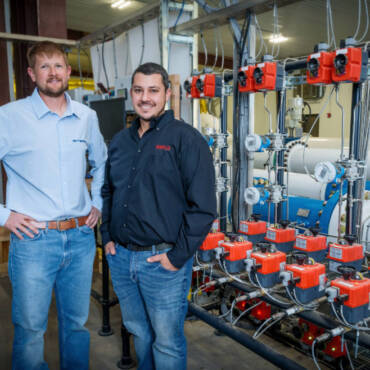After 25 years as a co-owner of a plumbing and heating company, Lynn Wise created a formula for home services customer care and accounting best practices with her company, Contractor in Charge.
In 2014, Wise realized that she could provide this system as a fully outsourced service. Thanks to her experience at Ameritech and IBM (which followed her tenure in HVAC), her team has harnessed the power of the latest technology available. Additionally, her solutions focus on old-fashioned customer care and real-time bookkeeping.
Founded in 2016, Contractor In Charge offers a decentralized and completely scalable answering service and bookkeeping for plumbers, electricians, and heating and air conditioning home service contractors — the “big three,” as she calls them. Contractor in Charge employs five managers and 20 degreed accountants to assist about 200 clients currently across the United States.
Wise credits her extensive experience in HVAC business management and her time at Ameritech and IBM for providing her with “a mature view” of how a business must use technology to structure front office service and revenue generation. As the saying goes, she’s been there and done it.
“What I learned in that journey, is that there are a lot of things the big boys do that the little boys should be doing, but don’t,” Wise said. “Technology is our friend, and it’s a matter of how we use technology; but don’t assume that it will fix everything, because it won’t. You have to know your in-goal and purpose, and what are the tools that will help you get there. And technology could be one or more of the solutions.”
The Price of Missed Calls
Our discussion with Lynn Wise focused on what a business owner must do to properly field incoming calls. Our first question: where should you start with the assessment?
“They will find they have too many calls that go into ‘abandoned’ status, or, if they have an office voice mail system, they will see too many calls going into voice mail or too many ‘hang-ups’,” she said.
Secondly, while it’s nice to give employees weekends off, Saturday is, in Wise’s words, “a money day.”
“Calls don’t only come in from 8:00 to 5:00 Monday through Friday,” she said. “In fact, I would argue that probably 10 percent or 15 percent of all calls come in before you open the door in the morning or after you’re closed. But if you’re not working on Saturday you should still have the ability to receive those calls, qualify them and book appointments for the future.”
Contractor in Charge begins its assessment of a client’s call handling needs by first asking about the volume of calls they receive, when the calls come in, and who is there to receive them and are there any gaps in phone coverage?
“Do they always eat lunch at their desk or do they skip lunch? People have to eat, go to the bathroom, or they may have to take a sick day. So, who’s the backup? That’s one of the first things you want to assess. Just because you can’t necessarily accommodate that as a full-time position or obtain other help for it, you need a resource to back you up,” she advises.
Wise said every company (even if they have people working in the office) has “concurrency of call.” At two or three times during the day, they’ll have a concurrency of calls that exceeds the number of people you have to answer those calls. Most owners come to the conclusion themselves; they realize they’re missing calls, or they don’t have a backup. That’s the standard reason for reaching out to Contractor in Charge.”
While answering a phone might seem like a mundane or lower-level occupation, professional phone communications is far from trivial, and there are now state-of-the-art practices that should be followed. Wise separates the front-office communications needs of a service company into four “skills”:
1. A skill to qualify and book calls.
2. A skill to handle customer service calls.
3. A skill to handle field communications and dispatch.
4. A skill to make outbound calls and inside sales.
“But how do you resource those skills? Most of the time you have a person who’s been placed into a position and told to do all four. Most will do one or two skills well and avoid the others, or not do them at all, or do them poorly. And in most cases, the customer suffers. So reevaluating this and how you do it is a larger strategy than simply having a backup employee to handle calls when someone is on lunch or sick.”
The “same-old, same-old” methods of fielding calls will severely impact revenue.
“I’ve been in this for many years, and it’s the same as it was in 1989,” Wise said. “We all think everything goes into one hole, and it doesn’t. That needs to be rethought. Rethink that and you may not cut costs, but you will streamline and be more efficient in doing things more effectively for better results.”
When asked, “how do you cut costs and not cut people?” Wise insists the service industry first needs to stop “throwing people at problems, rather than systems or processes.”
“I’ve done many financial statements, and companies are always too heavy in people. In most cases, it’s an underutilization of the staff you have because you don’t know how to ‘skill’ them into the right things at the right time. That is where we see the disconnect.
“And I’m not saying outsourcing is always the answer; I’m saying outsourcing is part of the strategy. And it may not be a strategy at all in some companies. You’ve got to optimize the resources you have as long as you know how to assess what you need.”
Contractor in Charge’s service is strictly for handling and booking inbound calls. They also train for inside sales, follow-ups, rehashes, membership scheduling and upselling, so the contractor can keep people employed to focus on what they do best.
“Our philosophy is that customer service [apart from setting appointments] should reside with the client, because they’re closest to the customer. Today, if the inbound call center professional receives a customer service call, they send a message to our client, the contractor, who is familiar with geography, and routing. But we can do inside sales, follow-ups, rehashes, membership scheduling and upselling, so the contractor can keep people employed to focus on what they do best.”
Throughout 2025, Lynn Wise wants to expand her sphere of influence and presence among HVAC, plumbing and electrical trades, and is open to presenting at major industry events. She said her “four skills” approach to phone training is virtually unheard of.
“When I describe the four skills, people say, ‘why didn’t I think of that?’”
She also wants to eliminate this viewpoint among business owners and manager: “it’s the same way we’ve always done it.”
Whether you require installation, repair, or maintenance, our technicians will assist you with top-quality service at any time of the day or night. Take comfort in knowing your indoor air quality is the best it can be with MOE heating & cooling services Ontario's solution for heating, air conditioning, and ventilation that’s cooler than the rest.
Contact us to schedule a visit. Our qualified team of technicians, are always ready to help you and guide you for heating and cooling issues. Weather you want to replace an old furnace or install a brand new air conditioner, we are here to help you. Our main office is at Kitchener but we can service most of Ontario's cities
Source link



